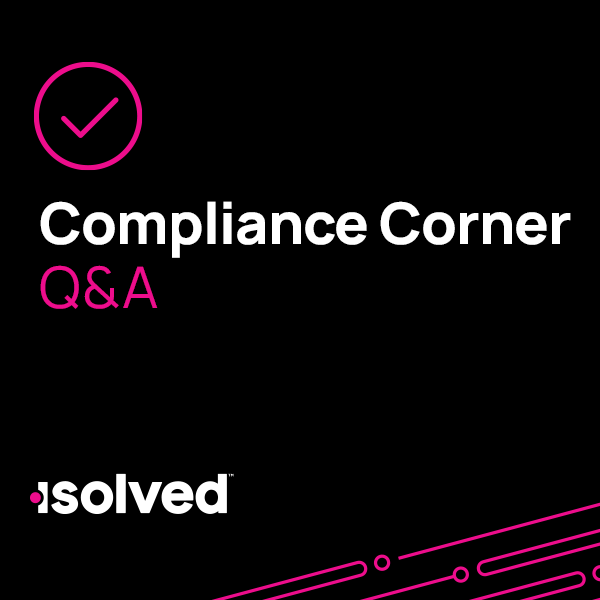Compliance Corner: Q&A on HR Outsourcing
Friday June 25th, 2021
Estimated time to read: 5 minutes, 15 seconds

Human resources (HR) teams have a lot of responsibilities – from talent acquisition and onboarding to benefit enrollment and payroll (and much more). With so many administrative tasks and deadlines, sometimes businesses look to outsourcing for assistance.
In this month’s Compliance Corner Q&A, People Services Manager Stephanie Lewerke is providing answers to some common HR outsourcing questions. Find out what you should know by reading the Q&A below:*
1. Can you describe the different types of HR outsourcing (HRO, PEO, ASO, etc.)?
The acronym HRO stands for Human Resources Outsourcing. This type of provider can service all or a portion of a business’s human resources needs. Companies will use HROs to develop and execute full-scale HR strategies or to simply supplement an overworked HR department. Some HROs also provide clients with access to a team of experienced HR managers.
Compared to other outsourcing solutions, a professional employer organization (PEO) becomes the employer of record for their customer organizations. PEOs provide a full range of services including payroll administration, employee benefits, risk management and compliance regulation.
An administrative service organization (ASO) is almost identical to working with a PEO, yet clients retain their own unique tax identification numbers. The ASO is not the employer of record in this relationship. Due to their degree of similarity, most PEOs offer an ASO option. They will provide all the same HR outsourcing services and technology, and their clients will get a different workers’ compensation and benefits plan.
2. Which HR functions are commonly outsourced?
Any business with an in-house HR department may find that team struggling to manage paperwork and deadlines. Outsourcing specific HR functions is an excellent way to complete time-consuming, error-prone tasks in a relatively short period of time.
HR functions that are commonly outsourced include:
• Payroll and tax services
• Benefits administration
• Temporary staffing
• Employment law compliance
3. What are some of the less common functions that a business can use HR outsourcing for?
If a company seeks a full-scale HR outsourcing provider or needs support for specialized HR functions, the following services can also become part of an outsourcing arrangement:
• Employee assistance/counseling
• Risk management
• Retirement planning
• Performance management
• Background and drug screening
4. What are some of the benefits for outsourcing HR functions?
Although outsourcing HR might not be right for all businesses, there are some significant advantages to doing so, especially when it comes to saving time and money.
a) Time and Cost Savings: For a department that does not generate revenue, maintaining an HR team in-house requires a significant amount of resources. At the end of the day, outsourcing HR functions can end up saving an employer a substantial amount of money. An outsourcing provider can lower costs in payroll processing, talent acquisition, training and compensation determination.
b) Risk Management: Employment and labor laws change regularly, and small businesses especially struggle to remain up to date on workplace regulations. Outsourcing firms employ HR professionals whose purpose is to stay current on federal and state employment laws. HR firms also maintain and audit company policies and practices to ensure your organization and your employees’ best interests are protected.
c) Specialized HR Talent: Juggling too many HR responsibilities often cannot be avoided, especially if a business does not have the budget to maintain a large HR department. When a company decides to outsource HR, each HR function is handled by highly capable experts who specialize in those functions.
d) Employee Performance Monitoring: An HR firm can report how employees are performing and whether they are complying with an organization’s policies and management decisions. Improved monitoring reduces administrative workload for managers and allows them to focus on more important business initiatives.
e) Enhanced Employee Benefits: Working with a PEO (and, therefore, an employer of record) can ultimately provide a business with access to much better health benefits for its employees. It is widely known that bigger companies with more employees often get access to more comprehensive coverage for better prices. A PEO can provide smaller businesses with the type of coverage options usually only available to larger corporations.
5. What should be taken into consideration when choosing which HR functions to outsource?
When potentially deciding to outsource, HR leaders should consider a team’s biggest headaches and look at which transactions they perform most often. Employers will also want to think about the areas in which their HR teams do not need to give as much input, such as answering questions or benefits enrollment.
Typically, HR outsourcing providers are specialists in providing HR services and can bring expertise to your organization that did not exist previously. For example, processes could become more legally compliant, efficient and standardized.
However, keep in mind that HR firms cannot always take on every task. Internal team members may still need to manage strategic aspects of HR such as talent acquisition, employee experience and people analytics.
6. What should a business look for in a good HR outsourcing partner?
Companies often outsource non-mission-critical processes, as well as tasks that do not contain confidential information. However, they may outsource updates to employee compensation or processing of payroll. Regardless of chosen service level, following are a few critical considerations for companies looking to outsource HR functions.
a) Cost versus Quality: While a low price can be attractive, it may also have an impact on the level of quality. Without the right level of service, you may run into issues such as data inaccuracies, incorrect payroll runs and stalled workflows. This negative experience can have an impact on motivation and retention of any staff directly affected by the quality of the outsourcing service.
b) Time Zone Coverage: Whether a business operates in a few time zones or across the country, it is important to have coverage across all hours of operation. If an employer operates globally, this may require a "follow-the-sun" model to cover all business hours.
c) Data Privacy and Protection: Since employers could potentially be transferring data across locations, it needs to be transported and stored securely. HR leaders should collaborate with their IT teams to understand data access requirements— such as strict system authorizations, VPN or access tokens—and take those into consideration. The outsourcing team could be large or located in different locations, and the employer should understand how this may affect service levels.
d) Length of Contract: Outsourcing contracts are usually long-term, ranging from three to ten years and even beyond. This level of commitment means that, once an organization chooses to outsource HR processes, there is often a long period before the employer can bring them back internally.
7. What role should technology play when looking for an HR outsourcing partner?
For the human resources industry, technology is used to attract, hire, retain and maintain talent, support workforce administration, and optimize workforce management. HR technology also provides managers with the necessary tools to allow them to make more effective HR-related decisions.
Human capital management (HCM) solutions are supposed to make the business of employing, empowering and enabling people easier and more efficient. However, typical within the HR function are the pains of different systems not “talking” to each other the way they should.
In addition to common methods for evaluating an outsourced HR partner (cost, service capabilities, location, etc.), employers should consider the breadth of technology offered and plan for future needs. HR firms should also offer comprehensive implementation and support services to accompany their technology offerings.
8. How can outsourcing HR help a business ensure compliance with government regulations?
Federal and state employment regulations are constantly changing. By remaining compliant with federal and state regulations, employers avoid potentially stiff financial penalties and remain agile in managing regulatory changes in the future.
While payroll tax compliance is usually top-of-mind for most businesses, there are numerous other federal, state, and local employment-related regulations that employers need to comply with, such as workers’ compensation, sexual harassment prevention requirements, hiring process compliance, and other workplace regulations. When small employers seek to remain up to date on all these compliance considerations, the effort can seem daunting.
An HR outsourcing partner can provide visibility as regulations change and proactively notify businesses operating within states affected by changes. As employers move into new states and jurisdictions, they can rest assured that their outsourcing partner is available for compliance support.

About Stephanie:
Stephanie is the manager of People Services for isolved. Stephanie has been serving in dedicated HR consulting positions since 2014. She assists clients with all aspects of their HR needs and specializes in compliance, technology maximization, payroll, recruitment, employee onboarding and employee relations. Stephanie’s expansive workforce experience provides her the opportunity to work with diverse organizations across a wide variety of industries.
* This blog is not legal advice. Please seek proper legal advice.
Need assistance completing your critical HR tasks? Discover how isolved People Services can help.
